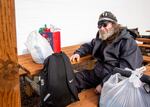
Mike McAtee ties a Christmas tree on top of his truck at the Activate Church Dream Center in Washougal, Wash., on Dec. 18, 2024. McAtee says even what's considered affordable housing in Washougal is out of reach.
Erik Neumann / OPB
Just before Christmas, around a dozen people filtered through Activate Church, a Christian ministry that serves the Columbia River Gorge towns of Camas and Washougal. Visitors were there for a hot cup of coffee and a plate of ham and grits. They perused donated clothing and stocked up on free canned goods and holiday bags.
One visitor, James Jackson, had lived in the area for the past two decades and wound up homeless years ago after a string of problems: He broke his back, forcing him to retire early, and he had fallen behind on child support payments. The final straw, he said, came when he was getting ready to leave town for a job and his car and boat were towed, along with all of his belongings and tools.

James Jackson sits out side the Activate Church Dream Center on Dec. 18, 2024. Jackson says he has camped out around Washougal for about a decade.
Erik Neumann / OPB
“The money to get your truck out of tow, and then the money to get your boat out of tow, it was going to be a couple grand,” Jackson said. “Another one that kicked me right in the guts. So, I kind of just gave up.”
Jackson estimated he’s been camping outside for about 10 years. But due to a new city ordinance, he could face consequences.
In Washougal, it is now illegal to camp on any publicly owned property. The initial penalty is a $75 fine. More violations lead to people being excluded from areas where they’ve camped and eventually arrested. It’s a sign of the shifting approaches to homelessness after the U.S. Supreme Court backed cities' rights to ban camping last year. Homeless advocates say the law will do little to solve outdoor camping.
The Washougal city manager, chief of police and mayor all declined interview requests. In a statement, city officials said that police will “prioritize compassion by offering access to and information about available resources, ensuring individuals are connected with the support they need.” They also noted that there are a number of nonprofit and faith groups in town that offer services including meals and safe overnight parking, and that the city offers hotel vouchers when funds are available.
City officials discussed the new ordinance in a public meeting in early December. At the time, councilor Molly Coston defended the plan saying it’s not meant to sweep all homeless people out of town, but is instead a tool for police when dealing with the most difficult homeless residents who don’t follow city rules.
Then-Police Chief Wendi Steinbronn, who retired in the new year, said the department wouldn’t tell people specifically where to go under the policy change. But officers would direct them to resources, which might be in Vancouver.
“There are no shelter services here in Washougal. Nor are there any in Camas. So, we do what we can to help these folks out,” she told the city council. “There’s really no place for them to camp, but we can’t advise them where to camp in Vancouver. I just wanted to make that clear.”

Jeff Liddicoat doesn’t like the term homeless—“I live outside,” he says, while attending an event held in at Pioneer Courthouse in Portland, Ore., April 22, 2024, organized by Stop The Sweeps PDX. The U.S. Supreme Court heard oral arguments for the Grants Pass v. Johnson case on Monday, in what is possibly one of the most consequential legal decisions on homelessness in decades.
Kristyna Wentz-Graff / OPB
The ordinance specifically mentions a U.S. Supreme Court decision from June focused on Grants Pass, Oregon. The court’s ruling allowed municipalities to enforce public camping bans, even if there’s nowhere else available for a person to sleep. More than 100 similar laws have been passed in communities around the country in the six months since the court’s decision, according to NPR.
“The way to end homelessness is through housing. It is not through tickets. It is not through camping bans. It is housing with services,” said Sesany Fennie-Jones, executive director of Council for the Homeless, the nonprofit that coordinates resources in Clark County.
She said many people experiencing homelessness actually have jobs, they just don’t make enough money to afford the rent in Clark County, a region that has seen notable population growth since 2020 and, like many others, is experiencing a housing shortage. Anti-camping ordinances can further disrupt people’s lives, Fennie-Jones said.
“Now they have no place to sleep. So now, they’re going to possibly lose their job because they have to figure out where to sleep outside. It is just unfortunate,” she said.
According to projections from Clark County in May 2024, about half of all the housing that needs to be built in Washougal in the coming two decades is low-income to meet state goals under the Growth Management Act. As for shelters, Washougal only has an emergency weather shelter.
“If it ain’t snowing out or it ain’t 100 degrees out, they don’t think about it,” resident Mike McAtee said.
At 66, McAtee has lived in Washougal his entire life. He lives in his truck currently. That will allow him to dodge the camping ban as long as he follows the rules around moving his vehicle. McAtee said he had tried to find housing in town, but even what is considered low-income is unaffordable.

Washougal resident Mike McAtee ties a Christmas tree on top of his truck on Dec. 18, 2024.
Erik Neumann / OPB
“You can’t get an apartment around here for less than $1,500 per month,” he said. “The new ones out here, they’re supposed to be low-income? $1,800. Low-income.”
If Washougal built a homeless village, like those in Vancouver, McAtee said he would live there. Vancouver has four tiny house villages to help people transition out of homelessness. Each village has individual shelters for up to 40 people. The city is also building a 150-bed congregate shelter that is expected to open in 2026.
Compared to Portland or even Vancouver, the homeless population in Washougal is small. Numbers for 2024 are not yet available, but according to a 2023 survey from Council for the Homeless, there were 149 people in Clark County who had a Washougal address before they became homeless. That represented just 2.3% of the county’s overall homeless population.
At least one other Clark County city is following Washougal’s lead. In February, Battle Ground will consider its own ordinance about unauthorized encampments. Public meeting records state that public camping has “not historically been a matter of significant concern in Battle Ground” but also cite Washougal’s ordinance as a reason to put a policy in place.
As for how cities respond, citations generally aren’t a deterrent for people camping in public, according to Jamie Spinelli, the city of Vancouver’s homeless response manager.
“People do not just disappear because you’ve given them a citation or put them in jail for a night,” Spinelli said. “So those communities will just in perpetuity be spending those dollars, because it is very expensive to utilize law enforcement and jail as your sole means of addressing homelessness. That’s very expensive.”

FILE - Jamie Spinelli stands at a homeless camp in Clark County on March 8, 2021. Spinelli says camping restrictions are not effective at providing long term solutions to homelessness.
Troy Brynelson / OPB
If she could wave a magic wand, Spinelli said, she would get every community in the region to agree on the same way to address homelessness. That way people experiencing homelessness wouldn’t have to worry about where to move tonight or tomorrow, and instead could focus on getting help.
“To me, and I think to the city [of Vancouver], it feels much more worthwhile to look at it and address it in a long-term sustainable way, even though that means we don’t get immediate results,” she said.
